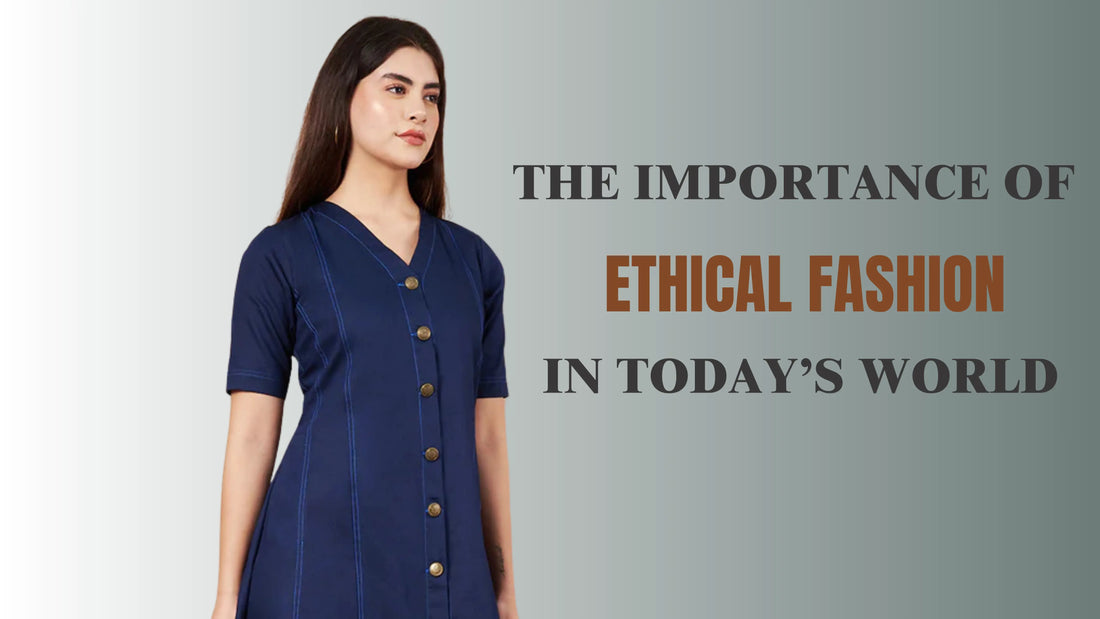
The Importance of Ethical Fashion in Today’s World
Share
In today’s world, the importance of ethical fashion is more significant than ever. As concerns over environmental damage and labor exploitation grow, many consumers are turning to brands that prioritize sustainable and humane practices. Ethical fashion addresses these issues by using eco-friendly materials, ensuring fair labor practices, and being transparent about production processes. This shift not only impacts the planet but also empowers communities and promotes a more responsible fashion industry.
How Ethical Fashion Contributes to a Sustainable Future
One of the key elements of ethical fashion is its commitment to sustainability. The fast fashion industry is notorious for its harmful environmental impact, but ethical brands are changing this narrative by adopting eco-friendly practices. By choosing sustainable fashion, consumers can reduce their carbon footprint and support more responsible production methods.
1. Using Eco-Friendly Materials
Ethical brands focus on using materials that have minimal environmental impact. Fabrics like organic cotton, recycled polyester, and hemp are grown or produced using fewer resources compared to conventional options. These materials often require less water, fewer pesticides, and produce less waste.
- Organic Cotton: Grown without harmful chemicals, this material reduces soil and water pollution.
- Recycled Fabrics: Using recycled fabrics, like recycled polyester, minimizes waste and saves energy.
For more on sustainable fabric choices, check out our article on the Benefits of Ethical Fabrics.
2. The Slow Fashion Movement
Ethical fashion is closely linked to the slow fashion movement, which emphasizes high-quality, long-lasting clothing. This approach stands in stark contrast to fast fashion, which encourages overconsumption and waste.
- Timeless Styles: Investing in timeless, high-quality pieces reduces the need for frequent replacements.
- Circular Fashion: Many ethical brands support a circular fashion economy by recycling or upcycling materials to reduce waste.
Discover how our Co-ords Set collection embodies the slow fashion ethos with versatile, high-quality designs.
The Role of Ethical Fashion in Promoting Fair Labor Practices
Another crucial aspect of ethical fashion is the promotion of fair labor practices. The traditional fashion industry often exploits workers in developing countries, paying them low wages and subjecting them to unsafe working conditions. Ethical fashion brands are committed to changing this by ensuring that workers are treated fairly and with respect.
1. Fair Wages and Safe Conditions
Ethical brands pay workers a living wage and ensure safe working environments. This commitment to labor rights in fashion empowers workers and contributes to poverty alleviation in many regions.
- Fair Trade Practices: Fair trade ensures that farmers and workers are compensated fairly, promoting economic stability.
- Labor Rights: Ethical brands are transparent about their labor practices, guaranteeing that no one is exploited in their supply chains.
For more about our brand's dedication to fair labor, visit our About Us page.
2. Empowering Local Communities
By supporting local artisans and small-scale producers, ethical fashion helps empower communities. Brands often work with artisans to preserve traditional craftsmanship while providing sustainable income opportunities.
- Community Development: Ethical brands often invest in community projects, such as education and healthcare.
- Local Artisans: Collaborating with local talent ensures that traditional skills are preserved and celebrated.
Transparency in the Production Process
Transparency is a fundamental value of ethical fashion. It means that brands are open about their supply chains and share information about how and where their products are made. This allows consumers to make informed decisions and trust that they are supporting responsible practices.
1. Supply Chain Transparency
Ethical brands prioritize supply chain transparency by disclosing information about their production processes. They provide details about factory conditions, the sourcing of materials, and labor practices.
- Certifications: Many ethical brands obtain certifications like Fair Trade or GOTS to validate their transparency efforts.
- Consumer Trust: By being transparent, brands build trust with their customers and encourage more conscious consumerism.
Learn more about our commitment to transparency in our blog on Commitment to Ethical Practices by Your Brand.
2. Ethical Production Standards
Brands that prioritize transparency also ensure that their production methods align with ethical and environmental standards. This commitment extends to responsible sourcing, reducing carbon footprints, and using cruelty-free methods.
- Green Fashion Choices: From carbon-neutral factories to cruelty-free fashion, ethical brands are making strides in sustainable production.
- Responsible Sourcing: Ensuring that materials are sourced responsibly helps minimize environmental damage and promote fair practices.
Supporting Local Communities Through Ethical Choices
Ethical fashion brands often go the extra mile by giving back to the communities they source from. By supporting local communities, these brands contribute to economic and social development in areas where support is most needed.
1. Creating Sustainable Livelihoods
Many ethical brands support local farmers and artisans by sourcing materials directly from them. This helps create sustainable income opportunities and promotes economic stability.
- Investing in Communities: Ethical brands often reinvest profits into community projects, like building schools or providing healthcare.
- Traditional Craftsmanship: By working with local artisans, brands help preserve cultural heritage while promoting economic growth.
2. Social Responsibility Initiatives
Ethical brands are committed to social responsibility, often supporting initiatives that uplift and empower communities. This includes providing education, healthcare, and safe working conditions for all workers in the supply chain.
- Empowerment Programs: Some brands offer training programs to help workers develop new skills.
- Community Outreach: Brands often engage in outreach programs to improve the quality of life in local communities.
For ideas on incorporating ethical fashion into your wardrobe, explore our Topwear and Bottomwear collections.
Conclusion
Ethical fashion is not just a trend but a necessary movement towards a more responsible and compassionate fashion industry. By prioritizing sustainability, fair labor, and transparency, ethical brands are making a significant difference. As a conscious consumer, choosing eco-friendly and ethically produced clothing can help promote a more sustainable future and support communities worldwide. Explore our How to Style Different Pieces guide for inspiration on how to wear these ethical pieces in your daily life.
